- Home
- Chevy Stevens
That Night Page 5
That Night Read online
Page 5
“That’s messed up,” Ryan said, looking at the bottle.
I glanced up. Shauna, Kim, and Rachel were laughing so hard they were almost bent over. Cathy was also smiling, but her cheeks were flushed and she didn’t meet my eye.
“You think this is funny?” I held the bottle in my hand like I was going to throw it. Rage coursed through my veins.
Shauna laughed. “You should’ve seen your face.”
“Did you do this?” I stepped forward. Behind me, Ryan grabbed my shirt.
She rolled her eyes. “Oh, my God. Talk about being paranoid. I wasn’t even close to your stupid drink.”
Had one of the other girls done it? Now I noticed that Amy was also hiding a laugh. “Sorry,” she spluttered. “It was just so funny, your expression.”
My face flushed with angry embarrassment—and hurt. My best friend was laughing at me. It was like ninth grade all over again.
Ryan’s friend, Greg, patted my back. “You’re supposed to smoke your smokes, not drink them.”
Everyone started laughing again. I even heard Ryan chuckle behind me. I turned around, ready to spaz at him, but he whispered, “Just go with it.”
Still angry, it took me a moment to catch on, then I realized what he meant. I started laughing, like swallowing a cigarette butt was the most hilarious thing in the world. The harder I laughed, the more everyone laughed with me. Shauna’s face changed from malicious joy to anger to rage before she shut it down and pretended to go along with the others.
“Let’s get out of here,” she said to her girls when the laughter died down. “This party’s getting boring.”
At the door, she gave me a final look. I smiled and waved.
CHAPTER FIVE
ROCKLAND PENITENTIARY, VANCOUVER
MARCH 1998
After the woman with the gray hair sat by me at lunch, Pinky, who’d been watching from where she worked in the kitchen, told me that her name was Janet.
“You don’t want to mess with that bitch,” she said. “Just listen to what she tells you but don’t get too friendly.”
I started observing Janet at lunch, careful never to look directly at her. Janet had a few girls she hung out with. One was really quiet—she watched everything with these intense blue eyes that reminded me of a wolf. She was short and stocky and they called her Yoda. There was also a younger girl, maybe in her twenties, who walked with all kinds of swagger, her eyes constantly flicking left and right, like she was itching for a fight. She talked really loud, using lots of hand gestures and swear words. Then there was Sugar, closer to Janet’s age, who had big brown eyes and a soft, sweet voice, suiting her nickname. She was Janet’s girlfriend, but I never saw them making out or anything. Pinky said they weren’t allowed to within sight of any guards, but gay women would sneak into the showers or each other’s cells. Sugar and Janet were always breaking up because Janet would cheat on her, but then Sugar would forgive her. Janet also had a husband on the outside who sent her money.
When I’d been there a couple of weeks and was still waiting for my phone and visitor lists to be approved, Janet started sitting by me in the yard while I was cooling down after my run. She’d tell me how things were inside, who I should talk to, who I should avoid. I wanted to avoid everyone, especially her, but I was careful to stay neutral when she told me stuff, and didn’t talk a lot. Sometimes I’d see her younger friend watching, the one who looked scrappy. Her nickname was Mouse, because she was always nibbling on crackers from the canteen. She’d run out and then have to trade cans of pop or packages of noodles for more. I could tell Mouse was jealous of the time Janet was spending with me and hoped she was too scared of Janet to do anything about it.
Janet and a few other women played cards every day in the activity area, which was where most the inmates hung out, but no one invited me to sit down. I still didn’t have any friends inside—Pinky ignored me outside our cell—but I was fine with that. I didn’t think of myself as one of them.
I started working in the kitchen, scrubbing pots and pans during the afternoon shift. To pass the rest of the time, I mostly slept or wrote long letters to Ryan. I cried so hard after reading his first letter that Pinky actually looked worried and asked me if I was okay. I rolled over and turned my back to her. I spent hours sleeping the next day, didn’t even bother showering. On my second day of lying in bed, Pinky gave my arm a shake and said, “Better get your shit together or they’ll throw you in the hole on suicide watch.”
I dragged myself out of bed after that, but when I got a letter the next week I plummeted back into depression, thinking about Nicole, what had happened to her, and about Ryan, wondering if we would ever see each other again. He was always so positive, writing about how we were going to be free soon, how we’d finally be together. His lawyer had hired a private detective and Ryan was sure he’d find who really killed Nicole. But it seemed like such a long time away, such a long shot, and I didn’t know how I was going to make it.
I tried rereading Ryan’s letters. I had to stay hopeful, had to focus on how much we loved each other. But my shock and disbelief were starting to fade, and I was spiraling more and more into the anger that had helped me get through my first day at Rockland. I woke up angry. I went to bed angry. When Pinky was down in the kitchen working, I’d wake up and start counting the days until we might hear about the appeal. I’d see each day stretching out in front of me like a long line of empty slots, and the despair and anger would build until I was sure I would crack.
* * *
My phone number list was finally approved, and I called home often, using the phone card I was given. Mom never answered. My dad’s voice was the only link to the outside world, and I needed to hear that he still loved me, that he always would. He told me that Mom missed me, that she was out shopping or taking a nap, but I knew he was lying. She just couldn’t bring herself to talk to me, couldn’t stop hating me. She’d never said so, but I saw it in her eyes, the way the hope leaked out of them with each witness’s testimony at the trial, until she could barely look at me. She just sat there, holding back sobs, Dad’s arm around her back, rubbing her shoulders, his face bleak. She didn’t even show up the last few days of trial. That’s when I knew she had stopped believing in me.
My dad wrote me letters, telling me to be strong, hang in there, they’d see me soon. Mom never wrote, never even signed the letters. It was the first thing I did, turn to the last page and look for her signature, but it was never there. I still hoped that she’d look into her heart and see I couldn’t have done it. Then, after I’d been at Rockland for a month, they both came for a scheduled visit.
Dad’s face was flushed after he came through security but it paled when he saw me sitting in my prison clothes, the guard watching everyone in the room through a window. I hated thinking of my parents going through the metal detector, having their stuff X-rayed, putting it all in a locker. The room had about seven tables, four chairs around each one. A couple of families were at two of the other tables. We weren’t allowed any physical contact, and I ached for a hug from my dad or to even hold his hand. They slid into the chairs across from me.
I tried to smile, fought to hold back tears thick in my throat. I didn’t want to freak them out. I looked at my mom, searching her eyes, wondering if it was a good sign that she had come. Her face was even thinner than the last time I had seen her, giving her dark hollows beside her lips, which were pale. Only a faint trace of lip liner was left, as though she’d chewed off all the color. Her hair was pulled back tight, the ends ragged in her ponytail. She was also starting to show some gray at the roots, so she must not have been going to the salon anymore for her monthly touch-ups. The lines were deeper around her eyes, which had the same exhausted, desolate expression she’d worn since the murder.
“Are you okay, honey?” Dad’s face was so kind, his voice so familiar. The voice I’d heard late at night when I battled measles or the flu, when I fell hard off my bike. But now there was this, and it c
ouldn’t be fixed.
“I’m all right,” I said, doing my best to smile. “Three meals a day and I can sleep all I want. What’s not to like?”
Dad tried to smile back, but Mom looked shocked for a second, anger flashing in her eyes: How can you make jokes? After what you did?
We retreated into silence. Dad glanced at Mom like he was waiting for her to say something, but her eyes were darting around to the other inmates and their families, her body stiff. Her hand fidgeted with her shirtsleeve, running the hem between her fingertips, twisting the buttons. For a moment she looked like she might rip one off, maybe run around the room screaming. I wished she would. Anything would be better than the contained agony she’d been walking around in. I wanted to reach out and grab her hand, hold her still, wanted to tell her a hundred times how sorry I was for bringing Nicole out with me that night. But I’d already said it before and she just stared at my mouth, watched my lips move. She couldn’t hear the words, no matter how many times I said them.
“How are you, Mom?” I said.
She pulled her mouth back in a smile, but it was strained and made her lips look even paler—bloodless. “Good, busy, with your dad’s work. We’re finally getting some contracts.”
I’d heard her hushed conversations in her office. We aren’t getting any calls. I don’t know if we’ll be able to keep the company, but we need the work, the lawyer bills, all the expenses. And another part of me died with guilt. Dad had reassured me over and over again. Don’t worry about us, we’ll be okay. Now justice had been served in the eyes of everyone in town, and my parents were getting work again. Everyone was moving on, except me.
Dad started chatting about one of the new houses he was building while Mom fiddled with her shirt and nodded once in a while, agreeing or adding a bit of information. They could’ve been at a dinner party, making conversation with a stranger. I was just as bad. I told them my new roommate was okay and I was settling in. I had no intention of joining any of the programs but I mentioned a couple, wanting to make them think I was focused on the future. I was finally being the responsible daughter they’d wanted. I tried to sound upbeat and positive, anything to make my dad’s shoulders ease down from where he was holding them around his neck—the way he’d been holding them for over a year.
Dad bought some chips and Cokes from the vending machine, and we shared them as we talked. Mom only nibbled on the corners and took tiny sips of her drink. The chips were dry in my own mouth, the carbonated liquid getting trapped in my throat, the sugar giving me a headache. I wished I had a cigarette.
They didn’t stay long, only a couple of hours. Then Mom looked at her watch, said, “We should get going … the ferry traffic, and you have to do that estimate tonight.” She glanced at Dad, and something was exchanged, some signal. She had come here for Dad, I saw it clearly now. He had made her come.
I met my dad’s eyes. “I love you, guys. Thanks for visiting—I really miss you.” The tears I’d been trying to hold back were now rolling down my face. I wiped them away quickly, before the other inmates saw me losing it.
Dad said, “We love you too,” and turned away, blinking hard like he was trying hard not to cry too. Mom was silent beside him while he composed himself.
“We’ll come back as soon as we can, hopefully in a couple of weeks,” he said. “Hang in there and stay strong for us, okay?”
“I will.” I glanced at Mom and she gave me a little smile, so forced it looked painful.
As they walked toward the exit Dad reached for Mom’s hand, but she didn’t hold it back, her hand limp in his. I remembered their raised voices behind closed doors after Nicole was murdered, how they’d retreat into silence whenever I entered the room. I’d thought my going away might help their marriage, but it seemed I was still the wedge driving them apart. I couldn’t stand thinking I’d taken something else from them that night.
* * *
After I’d been at Rockland for almost two months, Janet sat down beside me outside. I’d gotten another letter from Ryan that day and hadn’t felt like going for my run. I was just drawing circles in the dirt with my finger over and over.
“Pinky tells me you’ve got a boyfriend on the men’s side,” Janet said. “He was your codefendant?”
“Yeah.” I kept drawing circles.
“Girl, you can do easy time, or you can do hard time. Those letters you’re always writing, they just screw with your head.”
“I need him.”
“Things go a lot better in here if you don’t have anything left to miss on the outside. This is your world now, your home.”
My finger paused. “This isn’t my home.”
“Yeah, it is, kid. And you thinking you ain’t one of us, pretending and hoping like the guards are going to open up your cell one day so you can bounce out of here, is just making shit harder for yourself. You’re not going anywhere for a long time. And you’re not doing him any favors either. Men, they like to fix shit. If you’re sobbing to him, that’s going to make him go insane.”
“It’s not like that with us.”
“Just ask yourself if you feel better or worse after you get a letter from him.” She stood up. “It’s probably the same for him.”
After she left, I thought about what she’d said, still tracing circles in the dirt. Was she right? Was I making things harder on Ryan? I thought of how tough the last year and a half had been, not seeing him, how much harder it got when I’d finally been able to see him in court, where we still couldn’t be natural. Now we could only write. It was painful, being reminded of how much I loved and missed him, but I wasn’t going to stop. I needed him to talk about our future, how things would be when we were found innocent, when Nicole’s real killer was finally punished and she got some justice. I needed him to fill me with enough hope to carry me through the endless days. It was the only thing that kept me going. Our appeal date was only a month away. Thirty days. I could make it through another thirty days. I’d already made it through sixty.
I stared down at the unbroken circles in the dirt. That’s me and Ryan, unbroken.
* * *
A few days later, my parents made it over again. I hadn’t seen them in a month. I knew they’d already used up a lot of their savings on legal fees and couldn’t afford to come every weekend—the ferry was expensive and it was an all-day trip, an hour-and-a-half drive from Campbell River to the ferry in Nanaimo, the hour-and-a-half crossing time, then Vancouver traffic all the way out to the prison. My mom seemed even tenser this visit, her hands tearing at her fingernails every time I mentioned the appeal or lawyer.
Finally she said, “If it doesn’t go through, we can’t take it to the Supreme Court. We can’t keep paying for the lawyer.”
My dad grabbed her hand, pulled it away and held it tight, so she couldn’t pick at her nails. “Toni doesn’t need to hear that right now.”
“I think Toni does need to hear this.” Mom’s tone was bitter. “We’re nearly broke. We’ve lost just about everything.” The words hung in the air, tears forming in her eyes. She wasn’t talking about money anymore.
I felt tears building behind my own eyes. “I’m sorry, Mom.”
She stared down at my dad’s hand holding hers and slumped back in her chair like all the energy had left her body. Dad stroked her hand with one thumb. I thought about how long it had been since I’d felt a soothing touch and shook off a stab of jealousy, ashamed.
“Don’t worry, Toni,” Dad said. “Everything’s going to be fine.”
Mom’s head snapped in his direction so fast her ponytail swung. I remembered when we were growing up how much she hated it when he’d say, “It’s fine, don’t worry,” or “Everything’s going to be fine.” She’d say, “You can’t know that, Chris.” And now I knew exactly what she was thinking.
Nothing will ever be fine again.
She stood up, her voice breaking as she said, “I can’t do this.” She hesitated, looking down at me like she wanted to say som
ething else, but then she turned and rushed toward the exit, her hand over her mouth like she was holding back the words. Dad’s face was red as he watched her leave, and he was breathing fast, his forehead shiny with sweat. I worried about his health. Mom wore her stress on the outside, but what had all of this been doing to my father?
He met my eyes. “Your mother … I should make sure she’s okay. I’m sorry, honey. She’s still struggling.”
But she wasn’t. She was done, and we both knew it.
As he got up and walked away, I heard a noise to my left and glanced at the other table. Mouse was sitting with her family, her mother beside her. They were talking and laughing. She looked at the exit, where you could still see my father leaving, my mother long gone, and Mouse gave me a slow, mean smile.
* * *
After that terrible visit, my father still sent letters each week but with no mention of a visit—just news about work, the house, friends, and only brief mentions of my mother, what she’d planted in the yard, how she was repainting the fence and had bought a new patio set. I tried to read between the lines, tried to tell myself she might still come around one day. I wondered sometimes now if my father also believed I was guilty but loved me all the same. I don’t know which thought was more painful, and I knew I’d never be able to ask him.
I finally got the package from my dad with the photos I requested and Pinky grudgingly made room on the wall. Her side was mostly covered with photos of her kids—she had four, all in foster care. She cried sometimes because one of the foster parents wasn’t sending letters or bringing the kid for visits. Every week she’d get letters from the other ones, or little handmade cards. I taped up all the photos of Nicole and Ryan, then lay on my bed and stared at them until I finally fell asleep, Nicole’s sweet smile chasing me into my dreams.
* * *
A month later, I called my lawyer for news about my appeal, my hands shaking on the phone. His voice grim, he said, “I don’t have good news.”

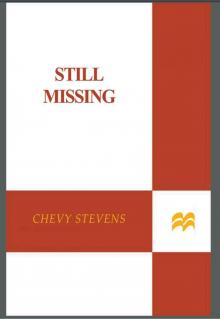 Still Missing
Still Missing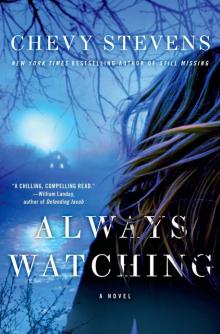 Always Watching
Always Watching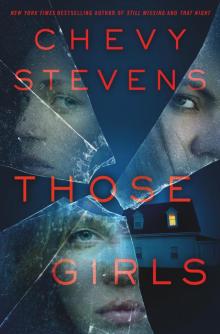 Those Girls
Those Girls Never Knowing
Never Knowing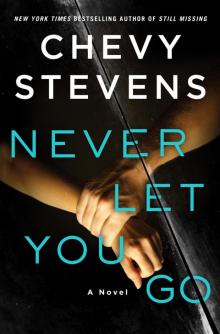 Never Let You Go
Never Let You Go That Night
That Night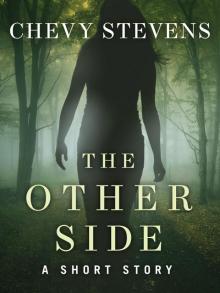 The Other Side
The Other Side Dark Roads
Dark Roads